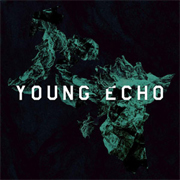It would be easy to draw parallels between the introspective and bass-heavy spaces of Bristol collective Young Echo’s debut group transmission and the city’s cult-worshipped trinity of Portishead, Tricky and Massive Attack. Nexus, however, is far more than a post-millennial take on 90s trip-hop. It’s more like a lateral study of Bristol’s musical heritage, drawing on trip-hop, yes, but also the city’s rich sound system culture and its unique contribution to the dubstep scene.
A continual state of flux is one of the most exciting things about electronic music, but all too often the ongoing need for new material in a saturated field results in a depressingly reiterative feedback loop that at least partly explains a number of revivalist current trends, from house to R&B to industrial, which mostly engage on an imitative and uncritical level with their once-subversive source material. That’s not a criticism you could level at Young Echo, the eight-strong collective of Vessel, El Kid, Kahn, Jabu, Neek, Manonmars, Zhou and Ishan Sound. They may wear their influences proudly, but they’re not enslaved to them, cherrypicking from the spectrum of Bristolian music with a critical eye plenty of young producers would do well to note.
Their shared obsession with the hiss, echo and crackle of tape is to be expected from a city whose many music scenes blossomed out of dub. But Young Echo manipulate tape’s many timbres to a number of interesting ends. The antique crackle on ‘Blood Sugar’ lends its halfstep percussion and stoned, filtered vocals a languorous, messy quality. That same medium on ‘Radial Sheaves’ imparts a sputtering froth and splintery hiss that hints at a producer equally versed in noise. Mucky and craggy rather than tuneful, the ‘Earth & Dust (Version)’ interlude sounds like the dub of a dub, all shadowy delay and ghostly tape textures.
Bristol’s trip-hop influence comes through most clearly on the vocal tracks. It’s hard to avoid comparisons between Tricky and the spoken word vocals from Jabu’s Alex Rendell on ‘Slow Jam’, but Rendell’s more fluent, less self-important flow and hint of aggro attitude reflects grime’s interposition between trip-hop’s prime and the present day. And ‘Nexus’ may boast the kind of plangent vocals that Beth Gibbons admittedly rinsed to death some time ago, but they come packaged with a Shackletonian attention to space and twitchy, Peverelistic drum patterns. Massive, torpid bass pulses through nearly every track on Nexus, the upshot of lifetimes spent skulking next to clubs’ subs.
Yet while the vocal tracks recall influencing artists fairly explicitly, the instrumental tracks are less specific, and more interesting as a result. Each song has its own identity, even its own subgenre, but it’s nearly impossible to tell who’s behind what. The barren, ominous ‘Umoja’ – the closest Nexus has to a dubstep track proper – could well be by Kahn, and the viscous daubs of mercury-like synth and stuttering drum machine percussion of ‘Untitled #7’ hint at the hand of Vessel. Excitingly, both could equally be the work of anyone else in the group.
As individuals, the members of Young Echo produce entirely different work and until now, have only released music individually, or as pairs and trios. Spread across a number of records, tapes and files, it’s not always easy to pin down the connection between the eerie dub techno of Vessel’s Order Of Noise, the ethereal drones of Jabu’s self-titled album for Astro:Dynamics, and Kahn and Neek’s raw grime. But Nexus, as the album art illustrates, draws lines between these points without quite revealing the factor that unites them – something intangible but fundamentally Bristolian. Young Echo’s members have already proven themselves to be talented individuals; when they pool their influences and styles as a collective, they draw a musical map of their home city.


